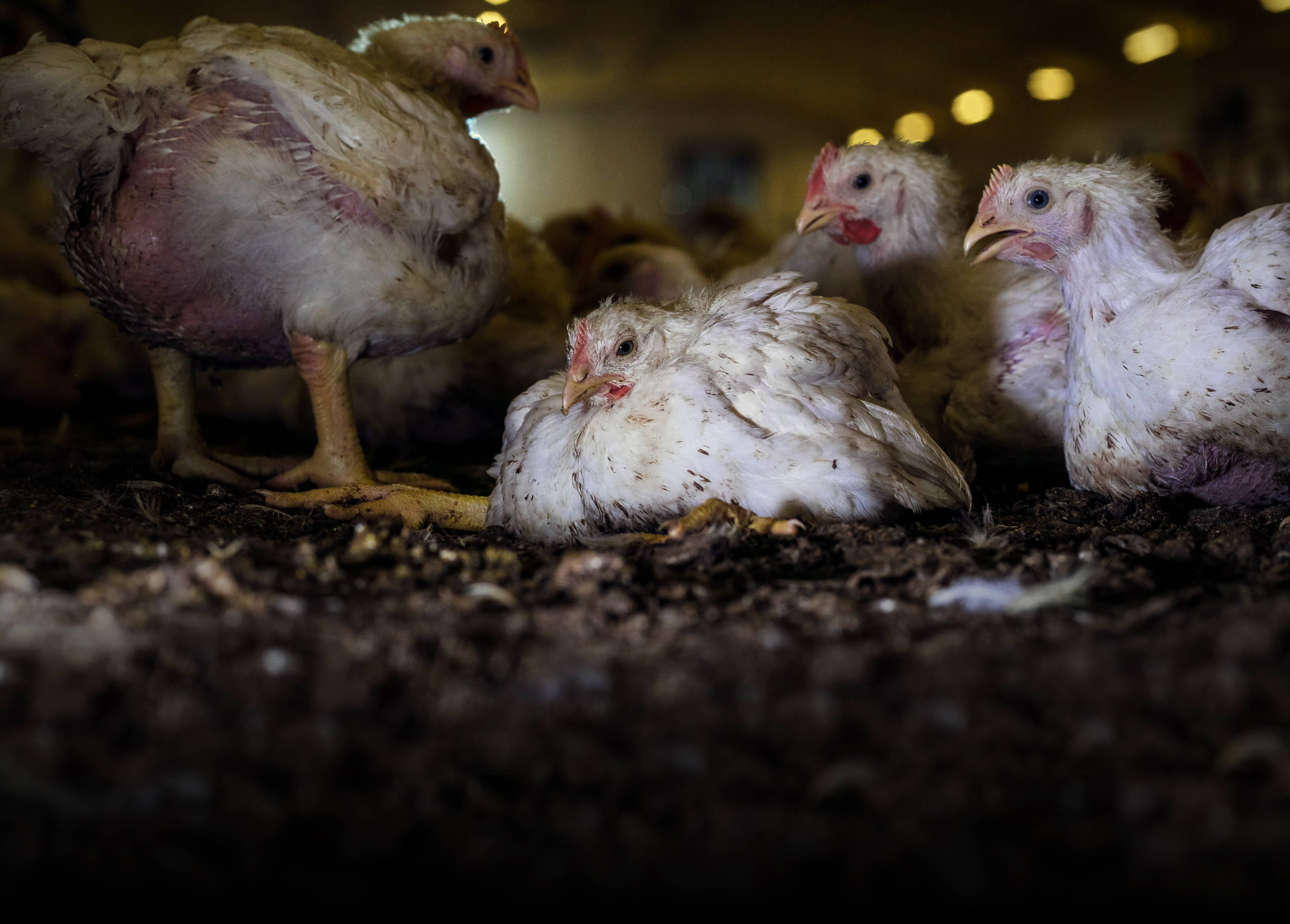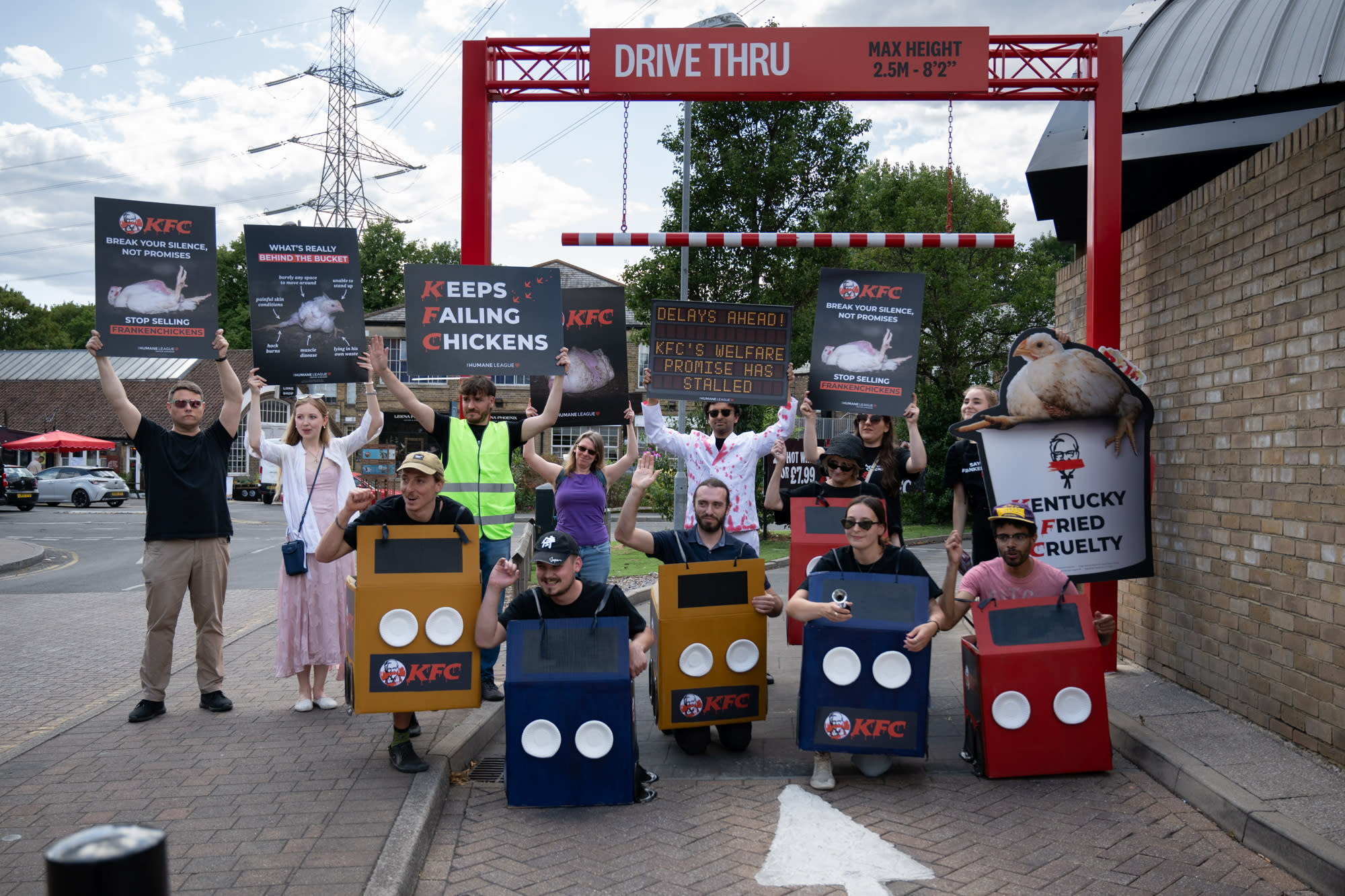




The Government is failing millions of chickens like Molly. Now we’re fighting back.

For our latest move in the fight for chickens raised for meat, we’ve filed a Judicial Review challenging the Government’s failure to prevent the widespread use of FrankenChickens, contrary to legislation designed to protect animals from suffering. The final decision could have monumental implications for the future of chickens in the UK.
To meet the demand for cheap breast meat, the industry has selectively bred chickens who grow unnaturally large, unnaturally fast.
Meet Molly. She is a FrankenChicken.

Her breast muscle grows so large, in just a few weeks, that the rest of her body simply can’t keep up. Molly suffers from lameness, often so bad that she’s forced to lie in her own waste while it burns her skin.
Almost unrecognisable from their wild ancestors, chickens like Molly who are raised for meat are bred to suffer. Their organs are often affected, with many suffering from heart disease. The unnatural growth affects their muscles, leading to issues for them and the meat that ends up on consumers’ plates.
This is not only morally wrong, but we believe it is unlawful. The Government rule states:
'Animals may only be kept for farming purposes if it can reasonably be expected, on the basis of their genotype or phenotype, that they can be kept without any detrimental effect on their health or welfare.'
The RSPCA published a scientific report in 2020 comparing the welfare of three different breeds of fast growing chicken. It showed that the fast growing breeds have poorer health and welfare than a slower growing breed. Three further scientific studies by the University of Bristol, the University of Guelph and the Royal Veterinary College all support these findings.
Despite this clear scientific consensus, as well as findings from numerous undercover investigations on farms using these breeds, Defra’s position is that fast growing breeds can be kept without detriment to their health or welfare.
But we disagree.
The law is clear that farmed animals can only be kept if the breed used will not experience detriment to their health or welfare. The science clearly shows that fast growing broilers cannot be kept without such detriment. It is therefore evident that keeping fast growing broilers is unlawful.
~ Edie Bowles, Solicitor at Advocates for Animals
That’s why we’re doing something about it. We’ve filed a Judicial Review challenging the Government.
The case is being brought in the high court against the Department for Environment, Food and Rural Affairs (Defra). It asks the court to determine that Defra’s policy to permit the current standard of farming fast growing ‘FrankenChickens’ in the UK is in breach of the Welfare of Farmed Animals (England) Regulations 2007.
There’s an assumption that because intensively breeding chickens to grow unnaturally fast is standard practice, it is therefore legal. But looking at the legislation it’s crystal clear that the law is being flouted in standard chicken production.
~ Pru Elliott, The Humane League UK
The case also challenges the ‘trigger system,’ Defra’s monitoring system meant to detect welfare issues in chickens raised for meat. The trigger system requires vets at abattoirs to report welfare issues, but these issues are only reported if they are over a given threshold. The threshold is set out in Defra’s Code of Practice, but we believe the threshold set by Defra is too high.
This means that countless welfare issues are not being reported and dealt with, leading to more extreme animal suffering.
There is another way. A way forward so that chickens like Molly are less likely to suffer from painful lameness and heart problems.
We’re working relentlessly to get companies across the world to commit to the Better Chicken Commitment (BCC). One of the standards that companies have to meet is using slower-growing breeds, proven to have less health issues and therefore suffer less.
KFC, Nando’s, Greggs, Marks and Spencer and Waitrose have already committed to the BCC, but with many companies still refusing, a ruling against the lawfulness of the FrankenChicken could make a monumental difference for chickens in the UK.
To keep up to date with developments, and hear more about our other campaigns for farmed animals, join us by signing up to receive our emails.

 Pru Elliott
Pru Elliott






